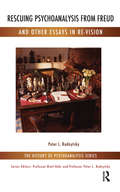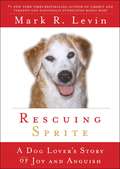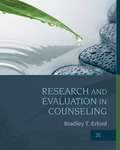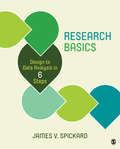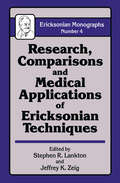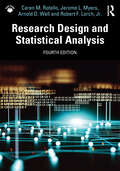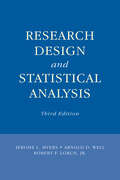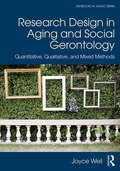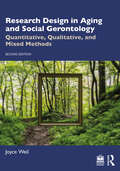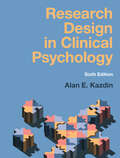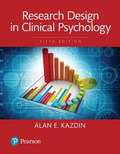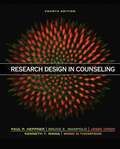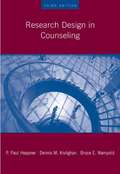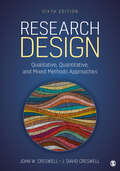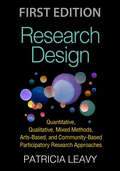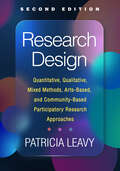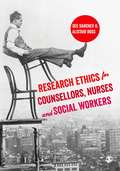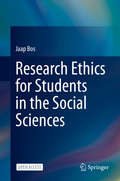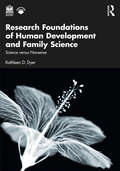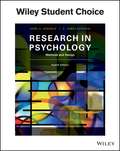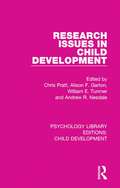- Table View
- List View
Rescuing Patty Hearst: Memories From a Decade Gone Mad
by Virginia HolmanIn 1975, one year after Patty Hearst and her captors robbed Hibernia National Bank, a second kidnapping took place far from the glare of the headlines. Virginia Holman's mother, in the thrall of psychosis, spirited her two daughters to a cottage on the Virginia Peninsula, painted the windows black, and set up the house as a MASH unit for a secret war. A war that never came. The family -- captive to her mother's schizophrenia and a legal system that refused to intervene -- remained there for more than three years. "What sets this book apart," theHartford Courantobserved, "is Virginia's voice. . . brave, smart, tough. " Reviewers nationwide have praised Holman's "riveting," "endearing," and "wryly humorous" story of a young girl caught in the whirlwind of madness -- a girl who chooses a brainwashed heiress as her role model. Holman's memoir vividly and brilliantly evokes the interior worlds of the sane and the insane and the delicate membrane in between. An essential exploration of identity, captivity, and love,Rescuing Patty Hearstwill inspire readers' faith in the resilience of one family's spirit to survive and thrive even in the direst of circumstances.
Rescuing Psychoanalysis from Freud and Other Essays in Re-Vision (The History of Psychoanalysis Series)
by Peter L. RudnytskyIn his latest groundbreaking book, the author examines the history of psychoanalysis from a resolutely independent perspective. At once spellbinding case histories and meticulously crafted gems of scholarship, Rudnytsky's essays are "re-visions" in that each sheds fresh light on its subject but they are also avowedly "revisionist" in their scepticism towards all forms of psychoanalytic orthodoxy. Beginning with a judicious reappraisal of Freud and ranging in scope from King Lear to contemporary neuroscience, the author treats in depth the lives and work of Ferenczi, Jung, Stekel, Winnicott, Coltart, and Little, each of whom sought to "rescue psychoanalysis" by summoning it to live up to its highest ideals.
Rescuing Sprite: A Dog Lover's Story of Joy and Anguish (Thorndike Basic Ser.)
by Mark R. LevinFrom the New York Times bestselling radio personality Mark Levin and his family comes the true story of the two years of joy and anguish they had with a rescue dog named Sprite.Mark Levin, while known as a lawyer and nationally syndicated broadcaster, considers himself first and foremost a dog lover. In 2004, Mark’s family added a new member to their bunch—a beautiful, Spaniel-mixed dog they named Sprite. With his beautiful face and soft, huggable fur, Sprite immediately bonded with the Levin family. But on Halloween night, just three weeks after being adopted, Sprite collapsed and had to be rushed to the animal hospital in what would turn out to be the first of many such visits—and a difficult, heart-wrenching journey for the entire family. Over the next two years, Sprite’s health deteriorated, but his spirit remained high and his beauty and grace continued to inspire, until the holiday season of 2006, when the Levin family had to say a final goodbye to their beloved pet. Rescuing Sprite is a stunningly intimate revelation of the strong love that can develop between a family and a pet, and the realization, as Mark Levin puts it, that “in the end, we humans are the lucky ones.”
Research And Evaluation In Counseling
by Bradley ErfordResearch is often an intimidating topic in a counselor training program. This text helps to alleviate students' concerns while helping them learn what they need to know. It presents the most essential components of research and illustrates them with meaningful examples, enabling students to master each component. Recognizing that the profession of counseling has entered the age of accountability, Erford developed RESEARCH AND EVALUATION IN COUNSELING to help educate counselors and future counselors about research and evaluation procedures so that their treatment of clients can be more effective and efficient. Organized into three topical sections, the second edition addresses the curricular requirements of the Council for Accreditation of Counseling and Related Educational Programs (CACREP), providing the latest information on research, statistics, and evaluation procedures.
Research Basics: Design to Data Analysis in Six Steps
by James V. SpickardResearch Basics: Design to Data Analysis in Six Steps offers a fresh and creative approach to the research process based on author James V. Spickard’s decades of teaching experience. Using an intuitive six-step model, readers learn how to craft a research question and then identify a logical process for answering it. Conversational writing and multi-disciplinary examples illuminate the model’s simplicity and power, effectively connecting the "hows" and "whys" behind social science research. Students using this book will learn how to turn their research questions into results.
Research Basics: Design to Data Analysis in Six Steps
by James V. SpickardResearch Basics: Design to Data Analysis in Six Steps offers a fresh and creative approach to the research process based on author James V. Spickard’s decades of teaching experience. Using an intuitive six-step model, readers learn how to craft a research question and then identify a logical process for answering it. Conversational writing and multi-disciplinary examples illuminate the model’s simplicity and power, effectively connecting the "hows" and "whys" behind social science research. Students using this book will learn how to turn their research questions into results.
Research Comparisons And Medical Applications Of Ericksonian Techniques (Ericksonian Monograph Ser. #No.4)
by Stephen R. Lankton and Jeffrey K. ZeigThis is the fourth volume in the widely hailed series of Ericksonian Monographs sponsored by the Milton H. Erickson Foundation as part of its expanding educational forum for mental health professionals. The Ericksonian Monographs make available original work - theory, clinical technique, case material, and research - on the cutting edge of Ericksonian thought and practice. Ericksonian Monographs No. 4 presents a richly stimulating collection of articles which deal with three extremely important areas of development in Ericksonian work: research, integration within the practice of other therapies and medical applications.
Research Design and Statistical Analysis
by Jerome L. Myers Arnold D. Well Caren M. Rotello Robert F. Lorch, Jr.This fully updated fourth edition of Research Design and Statistical Analysis provides comprehensive coverage of the design principles and statistical concepts necessary to make sense of real data. The guiding philosophy is to provide a strong conceptual foundation so that readers can generalize to new situations they encounter in their research, including new developments in data analysis.Key features include: Emphasis on basic concepts such as sampling distributions, design efficiency, and expected mean squares, relating the research designs and data analyses to the statistical models that underlie the analyses. Detailed instructions on performing analysis using both R and SPSS. Pedagogical exercises mapped to key topic areas to support students as they review their understanding and strive to reach their higher learning goals. Incorporating the analyses of both experimental and observational data, and with coverage that is broad and deep enough to serve a two-semester sequence, this textbook is suitable for researchers, graduate students and advanced undergraduates in psychology, education, and other behavioral, social, and health sciences.The book is supported by a robust set of digital resources, including data files and exercises from the book in an Excel format for easy import into R or SPSS; R scripts for running example analysis and generating figures; and a solutions manual.
Research Design and Statistical Analysis: Third Edition (Inquiry And Pedagogy Across Diverse Contexts Ser.)
by Jerome L. Myers Arnold D. Well Robert F. Lorch JrResearch Design and Statistical Analysis provides comprehensive coverage of the design principles and statistical concepts necessary to make sense of real data. The book’s goal is to provide a strong conceptual foundation to enable readers to generalize concepts to new research situations. Emphasis is placed on the underlying logic and assumptions of the analysis and what it tells the researcher, the limitations of the analysis, and the consequences of violating assumptions. Sampling, design efficiency, and statistical models are emphasized throughout. As per APA recommendations, emphasis is also placed on data exploration, effect size measures, confidence intervals, and using power analyses to determine sample size. "Real-world" data sets are used to illustrate data exploration, analysis, and interpretation. The book offers a rare blend of the underlying statistical assumptions, the consequences of their violations, and practical advice on dealing with them. Changes in the New Edition: Each section of the book concludes with a chapter that provides an integrated example of how to apply the concepts and procedures covered in the chapters of the section. In addition, the advantages and disadvantages of alternative designs are discussed. A new chapter (1) reviews the major steps in planning and executing a study, and the implications of those decisions for subsequent analyses and interpretations. A new chapter (13) compares experimental designs to reinforce the connection between design and analysis and to help readers achieve the most efficient research study. A new chapter (27) on common errors in data analysis and interpretation. Increased emphasis on power analyses to determine sample size using the G*Power 3 program. Many new data sets and problems. More examples of the use of SPSS (PASW) Version 17, although the analyses exemplified are readily carried out by any of the major statistical software packages. A companion website with the data used in the text and the exercises in SPSS and Excel formats; SPSS syntax files for performing analyses; extra material on logistic and multiple regression; technical notes that develop some of the formulas; and a solutions manual and the text figures and tables for instructors only. Part 1 reviews research planning, data exploration, and basic concepts in statistics including sampling, hypothesis testing, measures of effect size, estimators, and confidence intervals. Part 2 presents between-subject designs. The statistical models underlying the analysis of variance for these designs are emphasized, along with the role of expected mean squares in estimating effects of variables, the interpretation of nteractions, and procedures for testing contrasts and controlling error rates. Part 3 focuses on repeated-measures designs and considers the advantages and disadvantages of different mixed designs. Part 4 presents detailed coverage of correlation and bivariate and multiple regression with emphasis on interpretation and common errors, and discusses the usefulness and limitations of these procedures as tools for prediction and for developing theory. This is one of the few books with coverage sufficient for a 2-semester course sequence in experimental design and statistics as taught in psychology, education, and other behavioral, social, and health sciences. Incorporating the analyses of both experimental and observational data provides continuity of concepts and notation. Prerequisites include courses on basic research methods and statistics. The book is also an excellent resource for practicing researchers.
Research Design in Aging and Social Gerontology: Quantitative, Qualitative, and Mixed Methods (Textbooks in Aging)
by Joyce WeilResearch Design in Aging and Social Gerontology provides a review of methodological approaches and data-collection methods commonly used with older adults in real-life settings. It addresses the role of normative age-related sensory, cognitive, and functional changes, as well as the influence of generational cohort (age-period-cohort) upon each design. It discusses the role of older adults as true co-researchers; issues uniquely related to studies of persons residing in community-based, assisted, skilled, and memory-care settings; and ethical concerns related to cognitive status changes. The text concludes with detailed guidelines for improving existing data collection methods for older persons and selecting the best fitting methodologies for use in planning research on aging. Features of Research Design in Aging and Social Gerontology include: Descriptions and evaluations of a wide range of methodological approaches, and methods used to collect data about older persons (quantitative, qualitative, mixed, and emergent methods: photovoice, virtual environments, etc.) Ways to match research questions to selection of method without a preconceived methodological preference or dominance Real-world and applied examples along with cases from the gerontological literature "How to" sections about reading output/software reports and qualitative-analysis screenshots (from ATLAS.ti) and quantitative (SPSS) output and interpretation Pedagogical tools in every chapter such as text boxes, case studies, definitions of key terms, discussion questions, and references for further reading on chapter topics Glossary of key terms, complete sample research report, and an overview of past methodological research design work in gerontology Companion website at www.routledge.com/cw/Weil where instructors will find PowerPoint presentations, additional discussion questions, and a sample syllabus; and students will find flashcards based on glossary terms, a downloadable copy of the sample research report in the text, and links to data sets, related websites, further reading, and select gerontological journals This text is intended for upper-level undergraduates and masters students in aging and gerontology as well as students in human development, applied anthropology, psychology, public health, sociology, and social-work settings. Health care professionals, social workers, and care managers who work with older adults will also find this text a valuable resource.
Research Design in Aging and Social Gerontology: Quantitative, Qualitative, and Mixed Methods (Textbooks in Aging)
by Joyce WeilThis comprehensive book provides a review across methodological approaches and data-collection methods commonly used with older adults in real-life settings. It addresses the role of normative age-related sensory, cognitive, and functional changes, as well as the influence of generational cohort (age-period-cohort).Fully updated, this second edition reflects recent changes in gerontology and includes more information about equity, diversity and inclusion; the impact of the COVID-19 pandemic; the use of virtual research methods; discussion about the researcher’s reflexivity; the role of theory in research; qualitative research developments; an expansion of secondary analysis of data;and the use of artificial intelligence in research.Features include: Descriptions, evaluations, and applications of a wide range of methodological approaches and methods used to collect data about older persons (quantitative, qualitative, mixed, and emergent methods: photovoice, virtual environments, etc.) Ways to match research questions to selection of method without a preconceived methodological preference or dominance Real-world and applied examples along with cases from the gerontological literature "How to" sections about reading output/software reports and qualitative-analysis screenshots (from NVivo) and quantitative (SPSS) output and interpretation Pedagogical tools in every chapter such as text boxes, case studies, definitions of key terms, discussion questions, and references for further reading on chapter topics Glossary of key terms, complete sample research report, and an overview of past methodological research design work in gerontology This text is intended for upper-level undergraduates and masters students in aging and gerontology as well as students in human development, applied anthropology, psychology, public health, sociology, and social work settings. Healthcare professionals, social workers, and care managers who work with older adults will also find this text a valuable resource.At www.routledge.com/cw/weil instructors will find PowerPoint presentations, additional discussion questions, suggestions for in-class activities and assessments and a sample syllabus; and students will find flashcards based on glossary terms, a downloadable copy of the sample research report in the text, links to data sets, related websites, online videos and podcasts, further reading, select gerontological journals and multiple choice and true or false questions.
Research Design in Clinical Psychology
by Alan E. KazdinGain a thorough understanding of the entire research process – developing ideas, selecting methods, analyzing and communicating results – in this fully revised and updated textbook. The sixth edition comprises the latest developments in the field, including the use of technology and web-based methods to conduct studies, the role of robots and artificial intelligence in designing and evaluating research, and the importance of diversity in research to inform results that reflect the society we live in. Designed to inspire the development of future research processes, this is the perfect textbook for graduate students and professionals in research methods and research design in clinical psychology.
Research Design in Clinical Psychology (Fifth Edition)
by Alan E. Kazdin<P>The purpose of this text is to describe and explain research methods in clinical psychology but the issues and methods are relevant to other areas as well, such as counseling, educational, health, and school psychology, psychiatry, social work, and nursing. <P>The topics within each of these areas span theory, research, and application.
Research Design in Counseling
by Bruce E. Wampold Thompson Jesse Owen Puncky Paul Heppner Kenneth T. WangWith enlightening examples and illustrations drawn from counseling literature, RESEARCH DESIGN IN COUNSELING, 4th Edition facilitates a conceptual understanding of research design as well as the important role of science in counseling and counseling psychology today. In doing so, the text fully addresses the strengths and weaknesses of all of the major designs, and focuses on a broad array of methodological issues. <p><p>In addition to introducing students to the existing scientific literature in counseling and counseling psychology, the authors address professional writing, ethics, and research training. Their evenhanded approach provides students with an understanding of the various types of research, including both quantitative and qualitative approaches. Writing more than just a how-to book, the authors present a compelling rationale for the necessity of conducting research, and persuasively promote the necessity for greater integration of science and practice to enhance the effectiveness of both science and practice in counseling and counseling psychology.
Research Design in Counseling (3rd edition)
by P. Paul Heppner Bruce E. Wampold Dennis M. KivlighanThis book, with enlightening examples and illustrations drawn from counseling literature, fully addresses the common problems that confront counseling researchers.
Research Design: Qualitative, Quantitative, and Mixed Methods Approaches
by John W. Creswell J. David CreswellThe Sixth Edition of the bestselling Research Design: Qualitative, Quantitative, and Mixed Methods Approaches provides clear and concise instruction for designing research projects or developing research proposals. This user-friendly text walks readers through research methods, from reviewing the literature to writing a research question and stating a hypothesis to designing the study. At each step in the process, authors John W. Creswell and J. David Creswell address qualitative, quantitative, and mixed methods approaches to encourage readers to choose the approach that best fits the research question. The Sixth Edition has been fully revised to reflect the 7th edition of the Publication Manual of the American Psychological Association with more inclusive language, updated citation styles, and updated writing suggestions. Updates reflect the latest developments in mixed methods and new research examples throughout help capture and demonstrate new trends in research. Included with this title: LMS Cartridge: Import this title’s instructor resources into your school’s learning management system (LMS) and save time. Don’t use an LMS? You can still access all of the same online resources for this title via the password-protected Instructor Resource Site. Learn more.
Research Design: Qualitative, Quantitative, and Mixed Methods Approaches
by John W. Creswell J. David CreswellThe Sixth Edition of the bestselling Research Design: Qualitative, Quantitative, and Mixed Methods Approaches provides clear and concise instruction for designing research projects or developing research proposals. This user-friendly text walks readers through research methods, from reviewing the literature to writing a research question and stating a hypothesis to designing the study. At each step in the process, authors John W. Creswell and J. David Creswell address qualitative, quantitative, and mixed methods approaches to encourage readers to choose the approach that best fits the research question. The Sixth Edition has been fully revised to reflect the 7th edition of the Publication Manual of the American Psychological Association with more inclusive language, updated citation styles, and updated writing suggestions. Updates reflect the latest developments in mixed methods and new research examples throughout help capture and demonstrate new trends in research. Included with this title: LMS Cartridge: Import this title’s instructor resources into your school’s learning management system (LMS) and save time. Don’t use an LMS? You can still access all of the same online resources for this title via the password-protected Instructor Resource Site. Learn more.
Research Design: Quantitative, Qualitative, Mixed Methods, Arts-Based, and Community-Based Participatory Research Approaches
by Patricia LeavyThis user-friendly book provides a step-by-step guide to using the five major approaches to research design: quantitative, qualitative, mixed methods, arts-based, and community-based participatory research. Chapters on each approach follow a unique format--they present a template for a research proposal and explain in detail how to conceptualize and fill in every section. Terminology commonly used within each approach is identified, and key moments of ethical decision making are flagged. Interdisciplinary research examples draw on current events and social justice topics. Unique coverage includes hot topics: replication studies and data sharing, tailoring proposals to different audiences, and more. The book also includes a general introduction to social research; an in-depth, practical discussion of ethics; and a chapter on how to begin a research study, from planning a topic to developing a research question via a literature review. Pedagogical Features *Multiple "Review Stops" in each chapter--quick quizzes with answer keys. *End-of-chapter writing exercises, research activities, and suggested resources. *Bold-face key terms and an end-of-book glossary. *Boxed tips from experts in the respective approaches. *Supplemental PowerPoint slides for instructors using the book in a class.
Research Design: Quantitative, Qualitative, Mixed Methods, Arts-Based, and Community-Based Participatory Research Approaches
by Patricia LeavyWith a new chapter on the literature review, this accessible step-by-step guide to using the five major approaches to research design is now in a thoroughly revised second edition. The prior edition's user-friendly features are augmented by a new companion website with worksheets keyed to each chapter. For each approach, the text presents a template for a research proposal and explains how to conceptualize and fill in every section. Interdisciplinary research examples draw on current events and social justice issues. Unique coverage includes hot topics--replication studies, data sharing, and preregistration; tailoring proposals to different audiences; and more. Terminology commonly used in each approach is identified and key moments of ethical decision making are flagged. The book includes a general introduction to social research, an in-depth discussion of ethics, and a chapter on how to begin a research study. New to This Edition *New or expanded discussions of theory and literature in quantitative research, replication studies, preregistration of research, the critical paradigm in qualitative research, mixed methods research, approaching different kinds of organizations in community-based participatory research, and more. *Chapter on the literature review, including the ethics of citational practices. *Companion website with worksheets to aid in learning and practicing each chapter's key concepts. *Updated examples, references, and recommended readings throughout. Pedagogical Features *Multiple "Review Stops" in each chapter--quick quizzes with answer keys. *End-of-chapter writing exercises, research activities, and suggested resources. *Bolded key terms and an end-of-book glossary. *Boxed tips from experts in the respective approaches. *Pointers to downloadable worksheets throughout the chapters. *Author-created PowerPoints and chapter tests with answer keys available to instructors using the book in a course.
Research Ethics for Counsellors, Nurses & Social Workers
by Dee Danchev Alistair RossResearch Ethics for Counsellors, Nurses & Social Workers is designed to help you make the best start in your research career. With ethical implications and considerations arising at each stage of the research process, engaging with the wide range of issues and ideas can often prove a challenge. Dee Danchev and Alastair Ross will help you overcome this challenge and become confident, skilled researchers by providing you with: -An in-depth explanation of the theoretical base for a range of ethical demands and approaches, equipping you with the tools to make the right decisions for your project. -Key research ethics findings so students can apply the latest thinking to your research practice. -Short case examples and checklists to help you apply theory to practice and reflect on what you have learned. -Further reading and important resources to support your continued learning. Whether you are an experienced researcher or coming to research for the first time, this highly practical, step by step guide, is a must for your bookshelf. Dee Danchev is a counselling psychologist and Pastoral Advisor at Nuffield College, Oxford. Alistair Ross is Director of Psychodynamic Studies and Dean of Kellogg College, Oxford.
Research Ethics for Students in the Social Sciences
by Jaap BosThis open access textbook offers a practical guide into research ethics for undergraduate students in the social sciences. A step-by-step approach of the most viable issues, in-depth discussions of case histories and a variety of didactical tools will aid the student to grasp the issues at hand and help him or her develop strategies to deal with them. This book addresses problems and questions that any bachelor student in the social sciences should be aware of, including plagiarism, data fabrication and other types of fraud, data augmentation, various forms of research bias, but also peer pressure, issues with confidentiality and questions regarding conflicts of interest. Cheating, ‘free riding’, and broader issues that relate to the place of the social sciences in society are also included. The book concludes with a step-by-step approach designed to coach a student through a research application process.
Research Foundations of Human Development and Family Science: Science versus Nonsense
by Kathleen D. DyerHuman Development and Family Science (HDFS) is an interdisciplinary and applied field that draws from developmental science, family science, and other social sciences. Research Foundations of Human Development and Family Science is a textbook that provides an introduction to the diverse scientific research methods that form the foundation of scholarship and practice in HDFS. In Part I, Kathleen D. Dyer explores science. She distinguishes empirical scientific research from common sense and from knowledge gained from personal experience. This section also includes a discussion of the strategies used by pseudoscience to exploit the well-deserved credibility of science, providing relevant examples. Part II examines systematic empiricism through sampling and measurement. HDFS scholars use a wide array of measurement tools, including self-report (interviews, questionnaires, and self-report tasks), observations (participant, naturalistic, and structured), objective tests, physiological measures, and several types of archival records. Part III introduces the use of study design to achieve falsifiability in scientific research, including an overview of various orientations to time used in research as well as four different study designs: qualitative, prevalence, correlational, and experimental. Finally, Part IV addresses the public verifiability of science, including how scientific consensus is developed, the use of literature reviews to identify convergence of evidence, and how scientific literacy translates into evidence-based professional practice. Illustrated throughout with studies foundational to the discipline as examples of the strategies described in the text, Research Foundations for Human Development and Family Science is a comprehensive, accessible core textbook for undergraduate research methods classes in HDFS. It introduces the discipline of HDFS and challenges students to understand the limitations of common sense and the threat of pseudoscience for those work professionally with children and families.
Research In Psychology Methods and Design
by C. James Goodwin Kerri A. GoodwinAn approachable, coherent, and important text, Research in Psychology: Methods and Design, 8th Edition continues to provide its readers with a clear, concise look at psychological science, experimental methods, and correlational research in this newly updated version. <P><P>Rounded out with helpful learning aids, step-by-step instructions, and detailed examples of real research studies makes the material easy to read and student-friendly.
Research In Rehabilitation Counseling: A Guide To Design, Methodology, And Utilization
by James L. Bellini Phillip D. RumrillResearch In Rehabilitation Counseling: A Guide To Design, Methodology, And Utilization
Research Issues in Child Development (Psychology Library Editions: Child Development #11)
by William E. Tunmer Chris Pratt Alison F. Garton Andrew R. NesdaleFirst published in 1986, this authoritative book contains a selection of original, research based, reports of studies conducted in Australia and New Zealand in the field of Child Development. The topics have been arranged into four major sections – cognitive issues in development, language and reading development, perpetual motor development and social aspects of development. Both pure and applied research issues are presented, and the chapters cover child development from infancy to adolescence. The book’s special strength lies in the diversity of topics tackled and the range of developmental research represented. Theoretical viewpoints are raised and empirical questions answered in the studies reported. The editors have systematically drawn together important contributions which reflected contemporary topics in child development at the time. Although no one common theoretical or empirical theme unites either each section or the whole book (which reflects the general scope and diversity of child development in the 1980s), the contributors in general see the child as developing through active interaction with his or her environment. This interactionist position is clearly preferred by most researchers, who realised that simplistic genetic or environmental models are inadequate to explain the complex development of the child. The editors were all active researchers in the area of child development at the time and each co-authored a chapter in the book. All published regularly in national and international journals and books, and were aware of current developments in their main areas of expertise. All those interested in issues in child development will find this book important reading, as it provides the reader with an excellent and diverse selection of studies, bearing on a wide range of empirical research.

